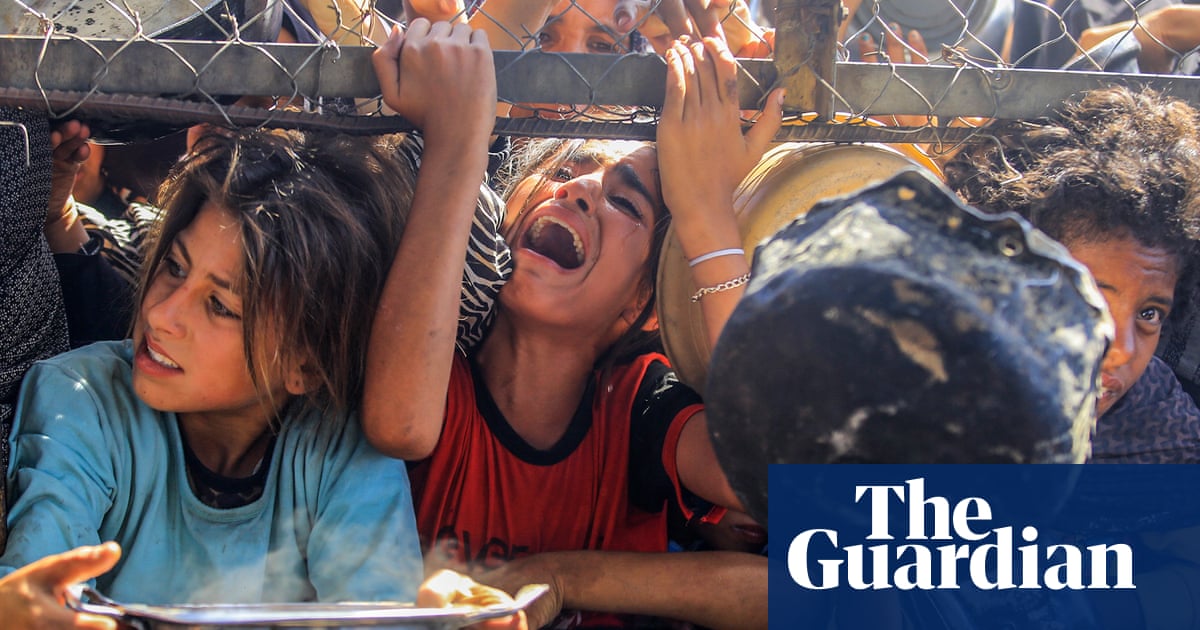Gaza is “the hungriest place on Earth”, according to the UN, which has warned that the Palestinian territory’s entire population is at risk of famine.
Jens Laerke, a spokesperson for the UN Office for the Coordination of Humanitarian Affairs, said the territory was “the only defined area – a country or defined territory within a country – where you have the entire population at risk of famine. One hundred per cent of the population at risk of famine,” he said on Friday.
“Gaza is the hungriest place on Earth.”
Laerke detailed the difficulties faced by the UN in delivering humanitarian aid to the Gaza Strip. Nine hundred trucks of humanitarian aid had been authorised by Israel to enter the strip since the blockade was partially lifted, but so far only 600 had been off-loaded on the Gaza side of the border, and a smaller number of shipments had then been picked up for distribution within the territory because of security considerations, he said.
Laerke said the mission to deliver aid was “in an operational straitjacket that makes it one of the most obstructed aid operations not only in the world today, but in recent history”.
Once truckloads entered Gaza, they were often “swarmed by desperate people”, he said.
Daniel Meron, Israel’s UN ambassador, rejected the claim, saying UN agencies “cherrypick the facts to paint an alternative version of reality and demonise Israel”.
“In a desperate effort to remain relevant, they lambast the best efforts of Israel and its partners to facilitate delivery of humanitarian aid to the civilian population. UN feeds Hamas, we make sure aid gets to those in need,” he wrote on X.
In a reflection of the increasingly dire conditions inside the territory, a UN spokesperson said late on Friday that “armed individuals” had raided a warehouse at a field hospital in Deir al-Balah, “looting large quantities of medical equipment, supplies, medicines, nutritional supplements that was intended for malnourished children”.
Hamas said on Friday it was “thoroughly reviewing” Israel’s response to a US proposal for a Gaza ceasefire deal, although one of the militant group’s officials said the plan did not meet any of the Palestinians’ “just and legitimate demands”.
Hamas has described the latest proposal as more biased in favour of Israel than previous versions. It said it was consulting other “Palestinian factions”, a term referring to other groups operating under Hamas’s rule in Gaza, such as Palestinian Islamic Jihad.
Late on Thursday, Benjamin Netanyahu told the families of hostages held in Gaza that Israel had accepted the draft deal presented by Steve Witkoff, Donald Trump’s Middle East envoy.
Deep differences between Hamas and Israel have stymied previous attempts to restore a ceasefire that broke down in March after only two months when Israel renewed its offensive.
Israel has insisted that Hamas disarm completely and be dismantled as a military and governing force, and that all 58 hostages still held in Gaza be returned before it will agree to end the war.
The Israeli government fears a lasting ceasefire and withdrawal would leave Hamas with significant influence in Gaza, even if it surrenders formal power. The Israelis are concerned that with time Hamas may be able to rebuild its military might and eventually launch more 7 October-style attacks.
On the other hand, Hamas fears Israel could break the ceasefire again and resume the war, which the Israeli government would be permitted to do after 60 days under the deal.
The militant group has rejected the demand to give up its weapons and says Israel must pull its troops out of Gaza and commit to ending the war.
Netanyahu also faces political constraints: his far-right coalition partners have threatened to bring down his government if he ends the war too soon. That would leave the prime minister more vulnerable to prosecution on longstanding corruption charges and to investigations into the failures surrounding the Hamas attack in 2023.
The far-right security minister, Itamar Ben-Gvir, said on Friday it was time to use “full force” in Gaza. “Mr Prime Minister, after Hamas rejected the deal proposal again – there are no more excuses,” Ben-Gvir said on his Telegram channel. “The confusion, the shuffling and the weakness must end. We have already missed too many opportunities. It is time to go in with full force, without blinking, to destroy, and kill Hamas to the last one.”
The Gaza Humanitarian Foundation, a private logistics group backed by the US and endorsed by Israel, expanded its food distribution to a third site on Thursday.
Heavily criticised by the UN and other aid groups as inadequate and flawed, the group’s operation began this week in Gaza after Israel’s 11-week blockade on aid entering the territory.
Laerke said that by having people collect aid rather than delivering it to them where they are, they become a target for looters once they leave the site. “It is so desperate and tragic and frustrating, and wildly unhumanitarian,” he said.
The launch was marred by tumultuous scenes on Tuesday when Israeli troops opened fire on a large crowd, killing at least one civilian and injuring dozens. The chaotic start to the operation has raised international pressure on Israel to get more food in and halt the fighting in Gaza. GHF says it has so far supplied about 1.8m meals, and plans to open more sites in the coming weeks.
Netanyahu has faced growing criticism from key international allies in recent days.
The French president, Emmanuel Macron, said on Friday that abandoning war-torn Gaza to its fate and giving Israel a “free pass” would kill the west’s credibility with the rest of the world.
“If we abandon Gaza, if we consider there is a free pass for Israel, even if we do condemn the terrorist attacks, we will kill our credibility,” Macron told a top defence forum in Singapore, adding: “And this is why we do reject double standard.”
Israel responded by accusing the French president of undertaking a “crusade against the Jewish state”.
“There is no humanitarian blockade. That is a blatant lie,” Israel’s foreign ministry said in a statement, defending its efforts to allow in aid. “But instead of applying pressure on the jihadist terrorists, Macron wants to reward them with a Palestinian state. No doubt its national day will be October 7.”
Macron said recognition of a Palestinian state with conditions was “not only a moral duty, but a political necessity”.
A “hardened stance” would mean dropping an assumption that human rights were being respected, and applying sanctions, he said.
Israeli jets continued to pound Gaza on Friday, killing at least 14 people in Jabaliya refugee camp, according to medics who received the bodies at al-Shifa hospital in northern Gaza. The previous day, Israeli strikes killed 45 people, including 23 in the Bureij camp in central Gaza Strip, Palestinian medical workers said.
Israel launched its campaign in Gaza in response to the devastating Hamas attack in southern Israel on 7 October 2023, in which 1,200 people were killed and 251 hostages taken into Gaza, according to Israeli tallies. The campaign has killed more than 54,000 Palestinians, Gaza health officials say, and left the territory in ruins.










